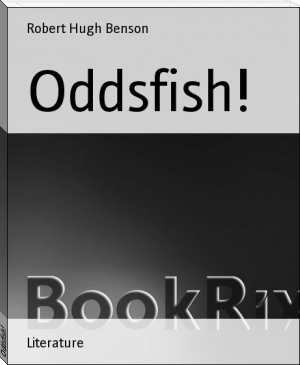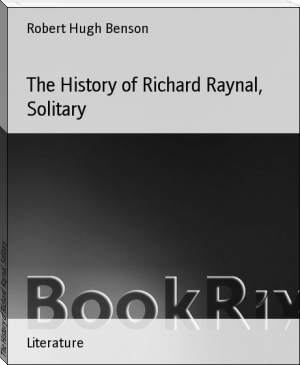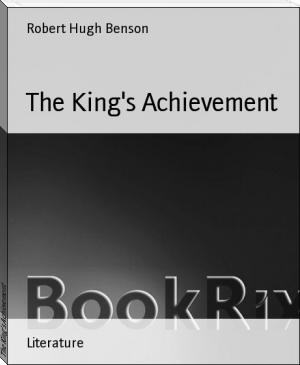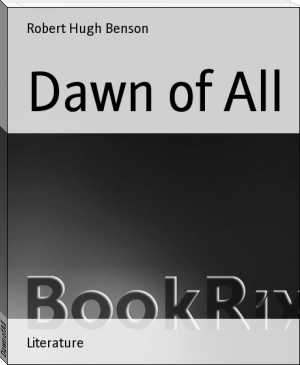Oddsfish! by Robert Hugh Benson (most interesting books to read .TXT) 📖

- Author: Robert Hugh Benson
Book online «Oddsfish! by Robert Hugh Benson (most interesting books to read .TXT) 📖». Author Robert Hugh Benson
"I am come to put myself wholly at Your Majesty's disposal," I said.
"Come! come! That's better," said Charles. "It is usually the other way about. _Servus servorum Dei_, you know. And in what manner do you propose that I should use you?"
"I will clean Your Majesty's shoes, if you will. Or I will run errands in my own. Or I will sing psalms, or ditties; or I will row in a boat; or I will play tennis, or fence. I am what is called an accomplished young gentleman, Sir."
Now I think I put in a shade too many clauses, for I was a little agitated. But the King's face lightened up very pleasantly.
"But I have plenty of folks who can do all that," he said. "In what are you distinguished from the rest?"
Then I determined on a bold stroke; for I knew that the King liked such things, if they were not too bold.
"I am a Jesuit at heart, Sir;" I said. "I desire to do these things, if Your Majesty wills it so, simply that I may serve His Holiness in serving Your Majesty."
"Oho!" said Charles; and he gathered his feet under him and looked at me more closely. I met his eyes fairly and then dropped my own.
"Oho! That is frank enough, Mr. Mallock. You know all about me, I suppose. You seem very young for such work. How old are you? Twenty-five?"
"I pass as twenty-five, Sir. But I am only twenty-one!"
"I would that I were!" said Charles earnestly. "And so you are a Jesuit in disguise--a wolf in sheep's clothing."
"No, Sir. I am a Jesuit at heart only, in that I would do anything in God's cause. But I am rather a sheep in wolf's clothing. I was a Benedictine novice till lately."
He seemed not to hear me. He had dropped his chin on his hand, and was looking at me as if he were thinking of something else.
"So you are come to serve me," he said presently, "in any way that I will; and you will serve me only that you may serve your master better. And what wages do you want?"
"None that Your Majesty can give," I said.
"Better and better," said Charles. "Nor place, nor position?"
"Only at Your Majesty's feet."
"And what if I kick you?"
"I will look for the halfpence elsewhere, Sir."
Then the King laughed outright, in the short harsh way he had; and I knew that I had pleased him. Then he stood up, and I saw that he was taller than I had thought. He was close upon six feet high.
"Well, Mr. Mallock," he said, "this seems all very pleasant and satisfactory. You said you would run errands. I suppose you mean to Rome?"
"To Rome and back, Sir," I said. "Or to anywhere else, except Hell."
"Oh! you draw the line there, do you?"
"No, Sir. It is God Almighty who has drawn it. I am not responsible."
"But you observe God His line?"
"Yes, Sir. At least, I try to."
"We all do that, I suppose. The pity is that we do not succeed more consistently ... Well, Mr. Mallock, I have nothing for you at present. I am a great deal too busy. These ladies, you know, demand so much. I suppose you heard one of them laugh just now?"
"I hear nothing but Your Majesty's commands," I said very meekly.
Charles laughed again and began to walk up and down.
"Well--and there are all these clockwork businesses, and chymical and the like. And there is so much to eat and drink and see: and there are the affairs of the kingdom--I had forgot that. Well; I have no time at present, Mr. Mallock, as you can see for yourself. But I will not forget you, if I want you. Where do you lodge?"
I named my lodgings in Covent Garden.
"And I have a cousin, Sir," I said, "who has bidden me to his house in Hare Street. I shall be here or there."
"His name?"
"Thomas Jermyn, Sir."
The King nodded.
"I will remember that," he said. "Well, it may be a long time before I have anything more to say to His Holiness. 'He that will not when he may--' You know all about that, I suppose, Mr. Mallock?"
"I know that Your Majesty has the reunion of Christendom at heart," I said discreetly.
"Yes, yes; I understand," said Charles. "I have received very favourable accounts of you, sir. And your letters, which are for the public eye, are perfectly in order. Well; I will remember, Mr. Mallock. Meanwhile you had best not shew yourself at Court in public too much." (And this he said very earnestly.)
He put out his hand to be kissed.
"And you will give my compliments to my brother James," he said.
* * * * *
One of the spaniels snored in his sleep as I went out again.
CHAPTER III
My interview with the Duke was a very different matter. I was informed at his lodgings that he was not yet come from tennis; and upon asking how long he would be, or if I might go to the tennis-court, was told that he might be half an hour yet, and that I might go there if I wished; so I went up from the river again, with a fellow they sent to guide me, down through the Stone Gallery, across the Privy Garden, and so across the street, midway between the gates, and so by the Duke of Monmouth's lodgings to the tennis-court. Here, as I went across the street, I caught sight of the sentries changing guard. These were the Coldstream Guards, in their red coats; for it was these foot-guards who did duty for the most part in the Palace and round about at the gates. The other troops about His Majesty were, first the King's Guards proper, who attended him when he rode out: these were in buff coats and cuirasses, very well mounted, and very gay with ribbons and velvet and gold lace and what not: and to each troop of these were attached a company of grenadiers with their grenades. Besides these were the Blues, also cavalry; and the dragoons, who were infantry on horseback, and carried bayonets. Of the foot-soldiers, such as the Buffs, most were mousquetaires; but some trailed pikes, and every one of them had a sword. These troops I saw constantly in town; besides the Yeomen who were closely attached to the person of his Sacred Majesty.
It was by the Duke of Monmouth's lodgings that I had my first sight of the Duke of Monmouth himself; for as I came towards the archway, by which were the lodgings of my Lady Suffolk, he himself came out from his own. I did not know who he was, until the fellow by me saluted him and doffed his cap, whereupon I did the same. I think I have never seen a more handsome lad in all my life (for he looked no more, though he was near thirty years old). His face was as smooth as a girl's, though not at all effeminate; he had a high and merry look with him, and bore himself, with his two friends, like a prince; he had violet eyes and arched brows over them. It is piteous to me now to think of his end, and that it was against his uncle by blood (whom I was to see presently) that he rebelled later, and by his uncle that he was condemned; and it is yet more piteous to think how he met that end, crying and cringing for fear of his life, both in the ditch in which he was discovered, and afterward in prison. He looked very kindly on me as he passed, lifting his hand to his hat; but I think he would not have so looked if he had known all about me; for he was as venomous against the Catholics as a man could be, or at least feigned himself so, for I think he had not a great deal of religion at any time. But he was to know me better afterwards.
When I came up into the gallery of the tennis-court I found it pretty full; yet not so full but that I could get a sight of the players. The Duke was in the court of the _dedans_ when I first came in, so I could see no more of him than his back and his cropped head; but when, after two _chaces_ he crossed over, I had a good view of him.
He was more heavily built than Charles; but his features were not unlike the King's, though he was fairer in complexion, I suppose; and his lip was shorter, and he wore no hair on his face. He had somewhat of a heavier look too in his face, without the fire that burned like embers in his brother's eyes. All this I noticed somewhat of, even from the gallery, though he was all a-sweat with his exercise.
I had left word with one of the men below as to my name and my business; and when the game was ended and the Duke went out, I remained still upstairs for a little, thinking that perhaps another would be played, and then perhaps he would send for me. But a servant came up presently and told me I was to follow to the Stone Gallery, where the Duke would walk for a while before changing his clothes, as his custom was. This Stone Gallery, as I had seen, was roofed, with skylights in it, and had presses of books all along the walls, together with collections of all kinds.
When I came to the Gallery he was at the further end, walking with Sir Robert Murray, as I learned afterwards, who was a very earnest Protestant, but always at Court; but when he saw me he sent Sir Robert away and beckoned to me to come. So I went up to him and kissed his hand, and he bade me walk with him for a little. (He had put on a cloak and hat to prevent his taking cold.)
Now his manner was wholly different from His Majesty's. There was a courtesy always in Charles that was not in James; for the Duke said nothing as to his receiving me here in his _deshabille_, but began immediately to talk in a low voice.
"I am pleased that you are come to England, Mr. Mallock. I have had news of you from Rome."
Then he asked very properly of the Holy Father, and of a Cardinal or two that he knew; and I answered him as well as I could. But I very soon saw that His Royal Highness wanted nothing like wit from me: he was somewhat of a solemn man, and had great ideas of his rights, and that all men who were below his own station should keep their own. He desired deference and attention above all things.
He spoke presently of Catholics in England.
"God hath blest us very highly," he said,
 Have you ever thought about what fiction is? Probably, such a question may seem surprising: and so everything is clear. Every person throughout his life has to repeatedly create the works he needs for specific purposes - statements, autobiographies, dictations - using not gypsum or clay, not musical notes, not paints, but just a word. At the same time, almost every person will be very surprised if he is told that he thereby created a work of fiction, which is very different from visual art, music and sculpture making. However, everyone understands that a student's essay or dictation is fundamentally different from novels, short stories, news that are created by professional writers. In the works of professionals there is the most important difference - excogitation. But, oddly enough, in a school literature course, you don’t realize the full power of fiction. So using our website in your free time discover fiction for yourself.
Have you ever thought about what fiction is? Probably, such a question may seem surprising: and so everything is clear. Every person throughout his life has to repeatedly create the works he needs for specific purposes - statements, autobiographies, dictations - using not gypsum or clay, not musical notes, not paints, but just a word. At the same time, almost every person will be very surprised if he is told that he thereby created a work of fiction, which is very different from visual art, music and sculpture making. However, everyone understands that a student's essay or dictation is fundamentally different from novels, short stories, news that are created by professional writers. In the works of professionals there is the most important difference - excogitation. But, oddly enough, in a school literature course, you don’t realize the full power of fiction. So using our website in your free time discover fiction for yourself. 




Comments (0)